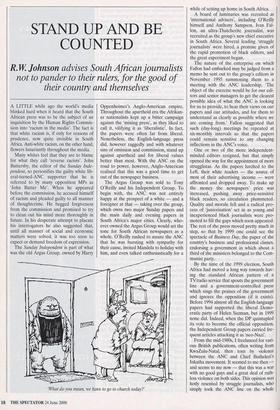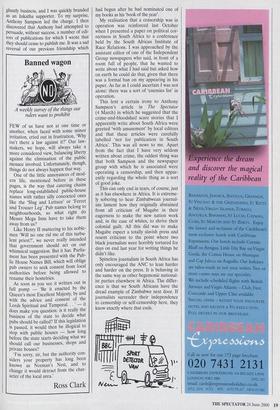STAND UP AND BE COUNTED
R.W. Johnson advises South African journalists
not to pander to their rulers, for the good of their country and themselves
A LITTLE while ago the world's media blinked hard when it heard that the South African press was to be the subject of an inquisition by the Human Rights Commis- sion into 'racism in the media'. The fact is that white racism is, if only for reasons of prudence, now quite invisible in South Africa. Anti-white racism, on the other hand, flowers luxuriantly throughout the media.
Many whites feel that they are to blame for what they call 'reverse racism'. John Battersby, the editor of the Sunday Inde- pendent, so personifies the guilty white lib- eral-turned-ANC supporter that he is referred to by many opposition MPs as `John Batter Me'. When he appeared before the commission, he accused himself of racism and pleaded guilty to all manner of thoughtcrime. He begged forgiveness from the commission and promised to try to clean out his mind more thoroughly in future. In his desperate attempt to placate his interrogators he also suggested that, until all manner of social and economic matters were solved, it was too soon to expect or demand freedom of expression.
The Sunday Independent is part of what was the old Argus Group, owned by Harry Oppenheimer's Anglo-American empire. Throughout the apartheid era the Afrikan- er nationalists kept up a bitter campaign against the 'mining press', as they liked to call it, vilifying it as 'liberalistic'. In fact, the papers were often far from liberal. Nonetheless, the English-language press did, however raggedly and with whatever sins of omission and commission, stand up against apartheid and for liberal values better than most. With the ANC on the road to power, however, Anglo-American realised that this was a good time to get out of the newspaper business.
The Argus Group was sold to Tony O'Reilly and his Independent Group. To begin with, the ANC was not entirely happy at the prospect of a white — and a foreigner at that — taking over the group, which owns two major Sunday papers and the main daily and evening papers in South Africa's major cities. Clearly, who- ever owned the Argus Group would set the tone for South African newspapers as a whole. O'Reilly rushed to assure the ANC that he was bursting with sympathy for their cause, invited Mandela to holiday with him, and even talked enthusiastically for a `What do you mean, we have to go to church today?' while of setting up home in South Africa.
A board of luminaries was recruited as `international advisers', including O'Reilly himself and Anthony Sampson. Ivan Fal- lon, an ultra-Thatcherite journalist, was recruited as the group's new chief executive in South Africa. Several leading 'struggle journalists' were hired, a promise given of the rapid promotion of black editors, and the great experiment began.
The nature of the enterprise on which Fallon had embarked may be judged from a memo he sent out to the group's editors in November 1995 summoning them to a meeting with the ANC leadership. The object of the exercise would be for our edi- tors and senior managers to get the clearest possible idea of what the ANC is looking for us to provide, to hear their views on our papers and our attitudes, and for them to understand as clearly as possible where we are coming from.' Fallon suggested that such (day-long) meetings be repeated at six-monthly intervals so that the papers could remain sensitive to any changing inflections in the ANC's voice.
One or two of the more independent- minded editors resigned, but that simply opened the way for the appointment of more strugglistas. As the papers lurched to the Left, their white readers — the source of most of their advertising income — were affronted and dropped away. To make up the money the newspapers' price was increased, pushing away price-sensitive black readers, so circulation plummeted. Quality and morale fell and a radical pro- cess of juniorisation' set in as young and inexperienced black journalists were pro- moted to fill the gaps which soon appeared. The rest of the press moved pretty much in step, so that by 1999 one could see the spectacle of Business Day, the paper of the country's business and professional classes, endorsing a government in which about a third of the ministers belonged to the Com- munist party.
By the time of the 1999 election, South Africa had moved a long way towards hav- ing the standard African pattern of a TV/radio service that spouts the government line and a government-controlled press which sings the praises of the government and ignores the opposition (if it exists). Before 1994 almost all the English-language papers had supported the liberal Demo- cratic party of Helen Suzman, but in 1999 none did. Indeed, when the DP quintupled its vote to become the official opposition, the Independent Group papers carried fre- quent articles attacking it as `neo-Nazi'.
From the mid-1980s, I freelanced for vari- ous British publications, often writing from KwaZulu-Natal, then torn by violence between the ANC and Chief Buthelezi's Inkatha movement. It seemed to me then and seems to me now — that this was a war with no good guys and a great deal of ruth- less violence on both sides. This opinion was hotly resented by struggle journalists, who simply took the ANC line on the whole ghastly business, and I was quickly branded as an Inkatha supporter. To my surprise, Anthony Sampson led the charge. I then discovered that Anthony had attempted to persuade, without success, a number of edi- tors of publications for which I wrote that they should cease to publish me. It was a sad reversal of our previous friendship which had begun after he had nominated one of my books as his 'book of the year'.
My realisation that a censorship was in operation was reinforced last October when I presented a paper on political cor- rectness in South Africa to a conference held by the South African Institute of Race Relations. I was approached by the assistant editor of one of the Independent Group newspapers who said, in front of a room full of people, that he wanted to write about what I had said but asked how on earth he could do that, given that there was a formal ban on my appearing in his paper. As far as I could ascertain I was not alone: there was a sort of 'enemies list' in operation.
This lent a certain irony to Anthony Sampson's article in The Spectator (4 March) in which he suggested that the crime-and-bloodshed scare stories that I apparently write about South Africa were greeted 'with amusement' by local editors and that these articles were carefully labelled 'not for publication in South Africa'. This was all news to me. Apart from the fact that I have very seldom written about crime, the oddest thing was that both Sampson and the newspaper group with which he is associated were operating a censorship, and then appar- ently regarding the whole thing as a sort of good joke.
This can only end in tears, of course, just as it has elsewhere in Africa. It is extreme- ly sobering to hear Zimbabwean journal- ists lament how they originally abstained from all criticism of Mugabe in their eagerness to make the new nation work and, in the case of whites, to shrive their colonial guilt. All this did was to make Mugabe expect a totally slavish press and resent criticism to the point where two black journalists were horribly tortured for days on end last year for writing things he didn't like.
Spineless journalism in South Africa has only encouraged the ANC to lean harder and harder on the press. It is behaving in the same way as other hegemonic national- ist parties elsewhere in Africa. The differ- ence is that we South Africans have the dread example of Zimbabwe next door. If journalists surrender their independence to censorship or self-censorship here, they know exactly where that ends.



































































 Previous page
Previous page